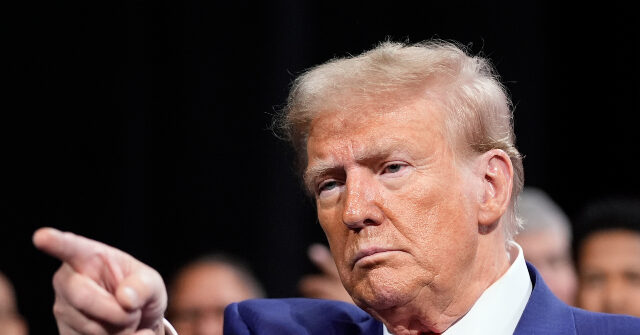Overview: The Controversy Surrounding Trump’s Firings of Top Generals
In a highly polarized political climate, five former U.S. Defense Secretaries have come together to demand congressional hearings into President Donald Trump’s recent firings of several high-ranking military officials. The group, comprising William Perry, Leon Panetta, Chuck Hagel, James Mattis, and Lloyd J. Austin III, expressed their alarm over what they describe as Trump’s “reckless actions.” These individuals, all of whom are either Democrats or have served in Democratic administrations, argue that Trump’s decisions undermine national security and call for accountability. Their letter, sent to major media outlets, has sparked a heated debate about presidential authority, military leadership, and political interference in the armed forces.
The Letter and the Call for Congressional Oversight
The five former secretaries penned a letter urging Congress to “hold Mr. Trump to account” for his firing of top military leaders, including Chairman of the Joint Chiefs of Staff Gen. Charles “CQ” Brown and several other senior officials. They claim that Trump’s actions lack justification and demand that the Trump administration provide detailed explanations for each dismissal. Additionally, they called on the Senate to block the confirmation of any new nominees for Defense Department positions until their concerns are addressed.
However, a senior defense official dismissed the letter as a political maneuver, stating, “This is a typical move by the left. Whenever they have something that’s bad news for them, or something that they want to accelerate, they’ll get former officials to line up.” The official also criticized the signatories as part of the “swampiest of the swampy,” implying that their motivations are partisan and self-serving.
The Legal and Constitutional Context of Presidential Authority
At the heart of the debate is the question of presidential authority under the U.S. Constitution. Article II, Section 2 designates the president as the commander-in-chief of the armed forces, granting the authority to appoint and remove military leaders at will. The fired officials served at the pleasure of the president, a principle that has been upheld throughout U.S. history. While the former secretaries argue that Trump’s actions were unprecedented and lacking in transparency, the legal framework clearly supports the president’s right to make such decisions.
Despite this, the former secretaries insist that Congress has a constitutional oversight role and should scrutinize Trump’s decisions to ensure they do not jeopardize national security. They argue that without accountability, such actions could discourage talented individuals from pursuing military careers, as they may fear being held to “political standards” rather than merit-based evaluations.
The Backlash and Questions About the Signatories’ Credibility
The letter has not gone without criticism, particularly regarding the credibility of its signatories. A senior defense official pointed out that all five individuals are either Democrats or anti-Trump figures, with some having their own controversial pasts. For instance, Leon Panetta, a Democrat and former CIA director, was one of the 51 former intelligence officials who signed a letter falsely claiming that the Hunter Biden laptop scandal was Russian disinformation. Panetta has yet to retract his endorsement of that letter, even after the FBI confirmed the laptop’s authenticity.
Other signatories, such as Lloyd Austin, have faced scrutiny for their own actions while in office. Austin, who served as Defense Secretary under President Joe Biden, was investigated for concealing multiple hospitalizations from Biden and his deputies, potentially disrupting the chain of command. Despite these issues, none of the signatories were held accountable, leading critics to question their moral authority to judge Trump’s leadership.
Implications for National Security and Military Recruitment
The former secretaries argue that Trump’s firings have weakened national security and created uncertainty within the military. They claim that such actions could deter capable individuals from joining the armed forces, fearing that their careers might be derailed by political Theater rather than professional performance. However, recent recruitment data tells a different story. According to figures from the Army and Navy, military recruitment has actually increased since Trump’s election in November, casting doubt on the letter’s assertions.
Moreover, critics argue that the letter reflects a broader partisan effort to undermine Trump’s authority and discredit his administration. The fact that no Republican former defense secretaries signed the letter—Notably, Mark Esper, Robert Gates, and William Cohen did not participate—further underscores its political nature.
Conclusion: A Partisan Battle Over Presidential Authority
The controversy surrounding Trump’s firings of top military leaders highlights the deepening partisan divide in Washington. While the former secretaries frame their letter as a call for accountability and transparency, critics view it as a politically motivated attempt to embarrass Trump and constrain his authority. The legal and constitutional basis for Trump’s actions remains clear, but the debate itself serves as a reminder of the ongoing power struggle between the executive branch and its political opponents.
As the 2024 election approaches, such battles are likely to escalate, with national security and military leadership becoming increasingly politicized. Whether Congress heeds the former secretaries’ call for hearings remains to be seen, but the broader implications of this dispute extend far beyond the firings themselves, touching on issues of presidential authority, military professionalism, and the integrity of the political process.


